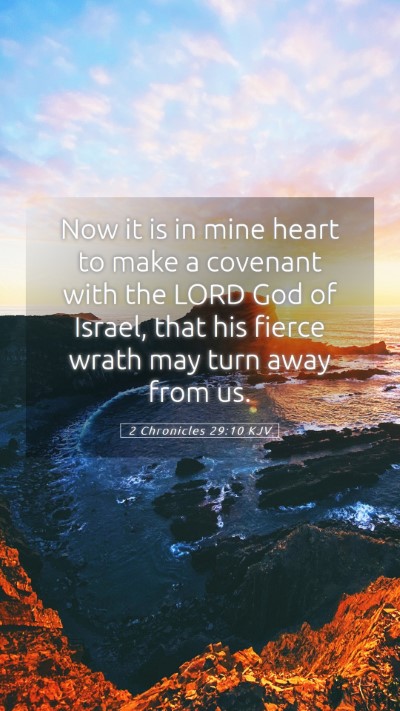Understanding 2 Chronicles 29:10
This passage is a part of the story of King Hezekiah's reforms in Judah, specifically concerning the religious restoration of the Temple worship. The verse reads:
"Now I have it in my heart to make a covenant with the LORD God of Israel, that His fierce wrath may turn away from us."
Here, King Hezekiah expresses his commitment to restore true worship among the people of Israel, emphasizing the importance of a covenant with God to avert divine displeasure.
Bible Verse Meaning
In this verse, several crucial themes emerge, including:
- Covenant Relationship: Hezekiah's desire to make a covenant illustrates the significance of personal and communal commitments to God.
- Divine Wrath: The mention of God’s fierce wrath highlights the consequences of disobedience and highlights the role of repentance.
- National Restoration: Hezekiah’s initiative symbolizes a collective return to faith which is essential for national blessings.
Commentary Insights
According to Matthew Henry's Commentary:
- Hezekiah's Resolve: Henry emphasizes that Hezekiah's intention to reform spiritual practices was motivated by a sincere desire to seek God's mercy.
- Historical Context: Understanding the historical backdrop in which Hezekiah operated elucidates why such a renewal was urgent at that time.
Albert Barnes adds further depth:
- Repentance and Atonement: Barnes notes that making a covenant with God often involves elements of atonement, where the people collectively turn away from sin.
- Covenant as a Key Theme: The biblical theme of covenant underscores God's enduring love and the mutual commitments required for His blessings.
Adam Clarke offers a nuanced interpretation:
- Symbolism of the Covenant: Clarke suggests that the covenant here is emblematic of a broader theme in Scripture where humanity is invited into relationship with the Divine.
- God’s Mercy: Clarke points out the underlying message of hope that accompanies Hezekiah's plea, showing that repentance leads to restoration of favor.
Application of the Verse
This verse serves as a poignant reminder for modern believers about the importance of:
- Covenant with God: Just as Hezekiah initiated a covenant, individuals today are called to commit to a relationship with God that involves ongoing repentance and faith.
- Collective Worship: The restoration of communal worship among God's people can lead to significant spiritual revitalization.
- Seeking God’s Mercy: Believers are encouraged to seek God’s mercy actively, recognizing the need for His intervention in their lives and communities.
Related Scriptures
To further enrich the understanding of this verse, the following Scriptures can provide additional insights:
- 2 Chronicles 7:14: This verse highlights the conditions under which God promises to heal the land, tying into the themes of repentance and divine favor.
- Isaiah 55:6-7: Isaiah calls for individuals to seek the Lord while He may be found, echoing the urgency in Hezekiah’s plea.
- 2 Kings 18:5-6: These verses detail Hezekiah's faithfulness to the Lord and the reforms he instituted, providing context for 2 Chronicles 29:10.
Conclusion
In conclusion, 2 Chronicles 29:10 serves as a powerful testament to the relationship between God's people and their covenant with Him. The collective turn toward God, exemplified by Hezekiah, offers significant lessons on the importance of seeking God's mercy and reforming worship practices in our contemporary context.


